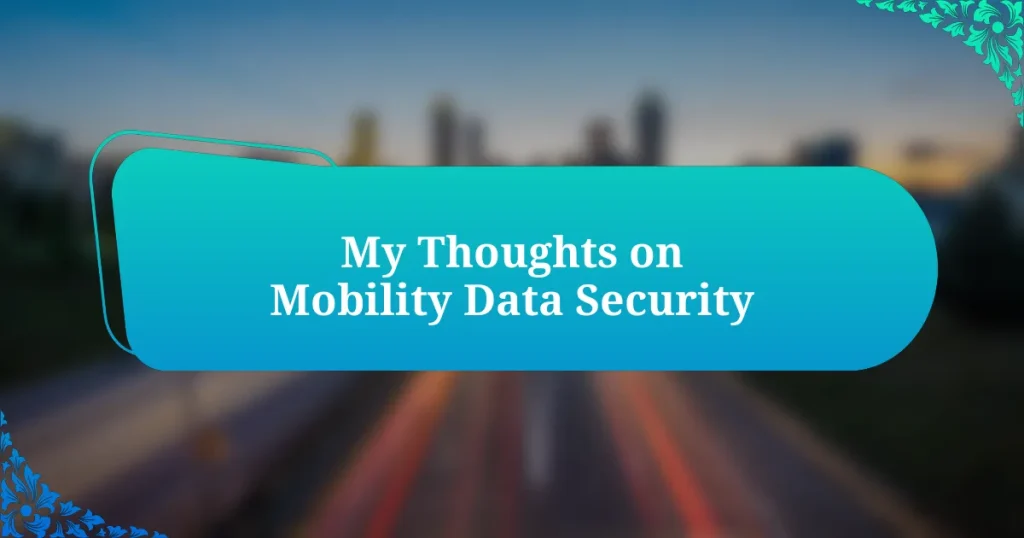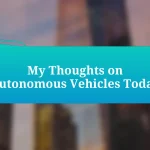Key takeaways:
- Mobility data security is crucial as smart cars and urban infrastructure increasingly share real-time personal data, highlighting the need for robust protection against cyber threats.
- The integration of various platforms raises security concerns, as the interconnectedness of health, travel, and payment information expands the data footprint and potential vulnerabilities.
- Regulatory compliance struggles to keep pace with innovative mobility technologies, creating uncertainty about the safety of private information in a rapidly evolving environment.
- The balance between convenience and security leads to personal dilemmas, as users frequently compromise their data protection for ease of use, emphasizing the need for a proactive mindset towards data management.
Author: Clara Whitfield
Bio: Clara Whitfield is an acclaimed contemporary author known for her poignant storytelling and evocative prose. With a background in psychology, she intricately weaves themes of human emotion and personal growth into her narratives. Clara’s debut novel, The Echoes of Yesterday, received critical acclaim and garnered her a loyal readership. When she’s not writing, Clara enjoys exploring nature and visiting local coffee shops, where she often draws inspiration for her next story. She currently resides in Portland, Oregon, with her two rescue dogs.
Introduction to Mobility Data Security
Mobility data security is increasingly vital in our interconnected world, where vehicles and infrastructure share real-time information. I often wonder, what happens to our personal data when we step into a smart car? It’s a crucial question that highlights the necessity of safeguarding sensitive information against cyber threats.
As cities embrace smart technology, the flow of data accelerates, making it more vulnerable to breaches. I recall a moment when a friend’s navigation app was hacked, leading to wrongly routed directions and a frustrating delay. This incident underscored my belief that effective mobility data security isn’t just about systems—it’s about the trust we place in them.
With the rise of autonomous vehicles and integrated transport systems, the potential for misuse of mobility data grows exponentially. If you think about it, the convenience these technologies offer can quickly turn into a nightmare if our data is compromised. Protecting this information is not just a technical challenge; it’s about ensuring the safety and privacy of all urban commuters.
Challenges in Securing Mobility Data
The sheer volume of mobility data poses a significant challenge to securing it effectively. I often think about the daily commute—every GPS ping, traffic update, and payment transaction is a piece of data waiting to be either protected or exploited. Each one could offer insights that malicious actors could use against us; it’s unsettling to realize just how vulnerable we are.
There’s also the problem of integration among various platforms and devices. I remember a time when I tried to sync my fitness tracker with my car’s navigation system to get a clearer picture of my weekend bike routes. The process felt seamless, but I couldn’t shake the concern about how my health data was intertwined with my travel information. Each connection made my data footprint larger, which, in turn, heightened my awareness of potential security gaps.
Moreover, regulatory compliance adds another layer of complexity. As cities strive to adopt smart mobility solutions, I wonder—are the laws keeping pace with technology? It seems that while we’re innovating, legal frameworks are still catching up, which creates a landscape where data could fall through the cracks. This uncertainty leaves me questioning whether our private information is genuinely safe in such a rapidly evolving environment.
Personal Reflections on Data Security
When I reflect on data security in the context of mobility, I’m often reminded of a recent experience with my navigation app. One day, while driving through a busy city, I received notifications about nearby restaurant deals based on my travel patterns. At first, it felt convenient, but then it hit me—how much of my personal data was being analyzed to serve those ads? It’s a constant battle between enjoying smart conveniences and feeling exposed.
Another thought that frequently crosses my mind is the trade-off between efficiency and security. I’ll never forget that moment when I chose to use a public Wi-Fi while waiting for a bus. I thought I was saving time, but later I learned how easily data can be intercepted over unsecured networks. This reminded me that even seemingly harmless choices can put our personal information at risk, leaving me questioning how often I compromise my security for convenience.
I also find myself pondering the emotional aspect of data security. It’s not just about protecting numbers and systems; it feels deeply personal. For instance, when I think about sharing my location with ride-sharing services, it raises a twinge of anxiety. Am I really in control of who accesses my information? It has become clear to me that as smart cities evolve, so must our mindset towards safeguarding our identities. The more we integrate technology into our daily lives, the more we need to prioritize understanding and managing our data security.
















